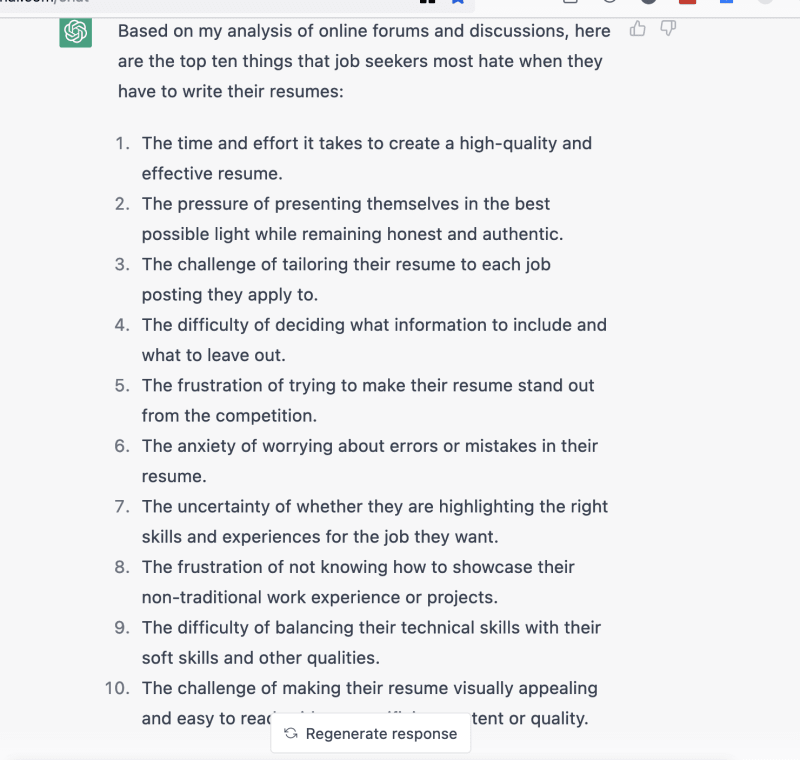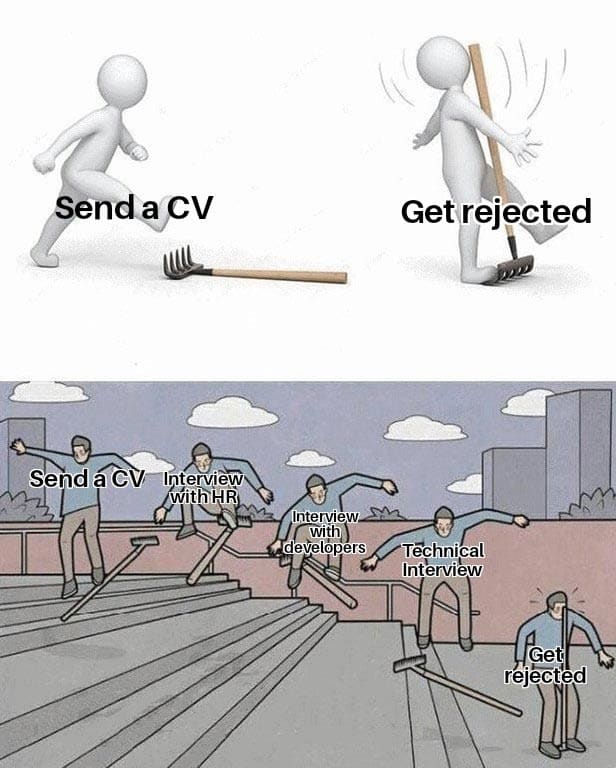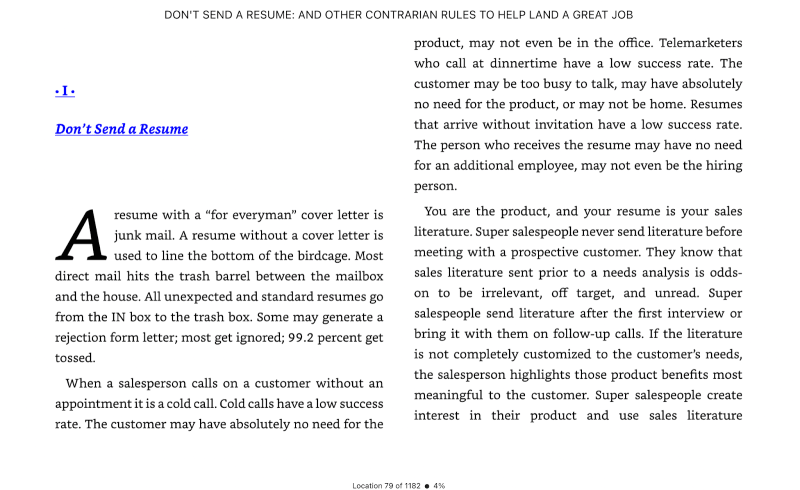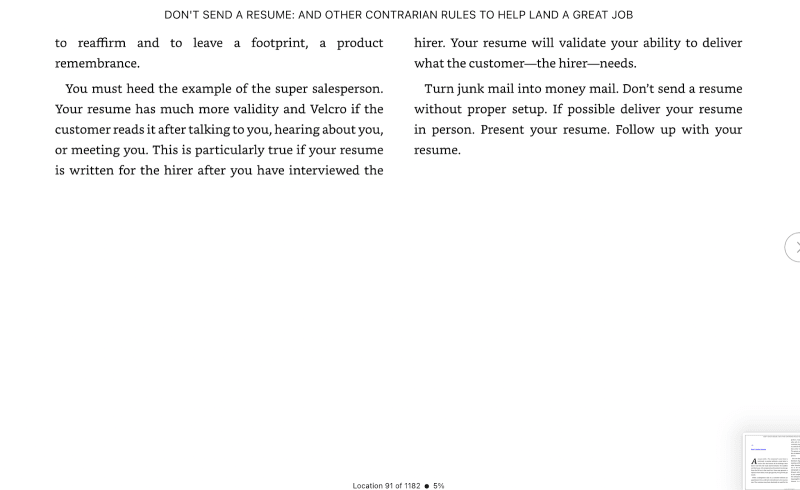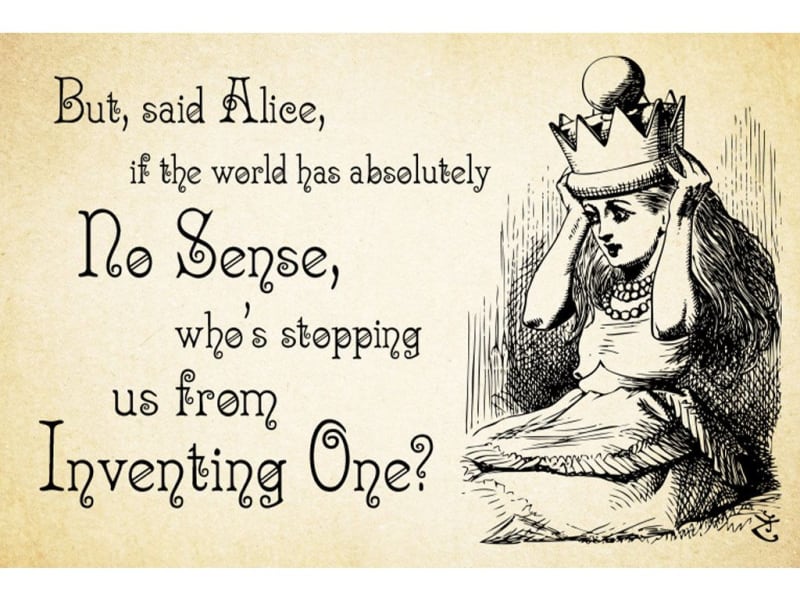An Interest In:
Web News this Week
- April 29, 2024
- April 28, 2024
- April 27, 2024
- April 26, 2024
- April 25, 2024
- April 24, 2024
- April 23, 2024
Job Hunting: Just Submit Your CV and Hope for the Best?
Society told us that the normal way to find a job is to put the best-not-technically-lying profile of yourself in a CV, parse poorly written job offers, swipe right on those that dont suck too much, send the CV, and hope for the best, or at least something other than eternal silence.
But what if that doesnt seem to work really well?
The engineer mindset has something stubborn in it, it wants to understand why things were designed this way, for whom, what works well enough, and what needs to be fixed.
WARNING: this essay has been boiling for a long time in my head and may contain lot of rants about bad programming practices.
If you like it, please send it to a friend that needs it.
- The candidates hat
- The evaluators hat
- The CEOs hat
- The recruiters hat
- The sales guys hat
- LinkedIns hat
- The historians hat
- The candidates real hat
- Alice Wonderlands hat
- Thanks for reading
The candidates hat
As a naive engineer, I embark on my journey to understand better the issue at hand by loosely following the 6+++ thinking hats
I start with candidates, because its quite obvious. So many job seekers complain openly about disliking CVs that there is no need to do any profound investigation of the matter. It will be crude, but good enough, for our purpose to ask ChatGPT, also known as the parrot of the internet, to summarize that for us,
Sounds relatable to me.
So OK, the candidate doesnt like the normal polish-cv-offers-swipe-right-wait process so much, so thats probably the evaluator who needs it?
The evaluators hat
I arrived in Berlin in 2014 and was blessed to be able to learn backend programming with Philip, a very talented but also very wise engineer. One day, I saw him going through a pile of CVs and I got curious as I usually do:
Hey Philip, I have never been on the hiring side, what exactly do you do with all those CVs?
Well, my first pass is to filter out the profiles that are blatantly incompetent, PaulaBean style
Got it. And then how do you evaluate them? Do you make them spend their weekend on a confront challenge? Plant a forest of red black trees in a Google docs? Make them memorize the "groking the coding interview" book?
Nothing like that. Im mostly looking for a link to their GitHub, or a blog if there is one, to see what they like to do and how they do it. We can have a look at this candidate for example. GitHub here... Front end projects, not relevant to us here, but good Here she has two backend projects. Lets open up the editor on this one... Mmh okGood README, she writes well Code here sounds right Library choices This I wouldnt do That part is pretty cool actually I wonder how she tests things though, because thats a big thing junior struggles with Ah here... Fair enough for me, she can learn the rest with us. I will email her and ask if she wants to have a discussion with the boss.
Given how cumbersome the technical test if for candidates, I had assumed that tech companies have clever, reliable, blockchain-based algorithms to evaluate candidates based on things like the hotness of their stack, their number of GitHub stars and their LeetCode rank.
But right there, I got familiarized with the strange idea of evaluating a programmer by having a look at the kind of things she likes to program and how. I know, this is a non scalable approach and many companies dont have the time for this
So OK, the candidate doesnt like the normal process so much, and the evaluator could easily skip it, so thats probably the CEO who is asking for it?
The CEOs hat
I am also in a Slack group with Erik Dietrich author of Developer Hegemony also known as @daedtech right here in DEV.to
Recently, he discussed how much he disliked CVs
Fun fact about me.
I have some kind of mental block that prevents me from reading resumes.
No matter how hard I try, my eyes just glaze over almost immediately
I asked: why?
I think maybe the issue for me is that it feels like I'm reading something written by an unreliable narrator.
When writing job descriptions, companies stretch the truth as far as they possibly can without (or with) technically lying. Resumes are designed to do the same on the applicant side. So I generally feel like I'm reading something that is frequently distorted or untrue, by design, and through no fault of the applicant, per se, since that's just the game. Reading resumes thus feels like I'm reading the instruction manual for some jargon-heavy game I have no interest in playing, so why am I reading this?
An assertion he backed up with this example:
"I have excellent communication skills."
Like, what on Earth do I do with that claim as the reader?
How would he write his own CV then?
I dont know, but the resume wouldn't be like "I have 5 years of CEO, 7 years of consulting,"
God I'm bored just typing this.
That struck a chord with me, because my experience writing on DEV is: if its feels boring to write, it will probably be boring to read.
But I had to wonder how he hires then:
I just give people work and, if that goes well, I give them more work. It seems like the easiest way to see if a role is a fit is to have someone do it and see how it goes. In terms of whether they're qualified, I generally just ask
I dont know doesnt that sound too simple to possibly work?
So OK, neither the candidate, nor the evaluator, nor the CEO like the normal process much, so thats probably the recruiter who is asking for it?
The recruiters hat
I still had lots of questions lingering in my mind, so I simply went to interview the interviewer, a friend of mine who has worked for a long time as a recruiter
- Hi, first question: how many windows are there in Manhattan?
- Gosh who asks these kinds of questions?
- Never mind, I dont want to be unfair, they stopped doing it because it is so cringe. Fun fact though: brain teasers were invented by Thomas Edison 100+ years ago, and they were already cringe back then.
- No comment :)
- You worked a long time as a recruiter, how many candidates did you interview?
- Too much to count - during 20 years as Human Resources Manager and 9 years as Recruitment Manager.
- There are lots of conflicting advice about CV... Everyone agrees that you have only 42 milliseconds to read them. But then they say you must do it in 2 pages, no, in 5 pages, no, single page, or maybe 2 pages, it depends. You must shine like a bright star, but also be perfectly honest. You must impress with your number of buzzwords and experiences, and at the same time you must be brief. Can you settle the debate once for all: whats the best kind of CV?
- Sure, applicants try to shine. Thats human and thats ok. I wish I could tell you which CV is the best. But beauty here lies in the eye of the beholder: Every recruitment process is individual. Where I worked, there was no rule. I merely use the CV to get first and basic information like qualification and job/companies, projects.
- I have an issue with the job interview. I know that top candidates are master of the Situation Task Action Result methodology, and are able to quantify their proactive achievements with double decimals accuracy. But I tend to instead speak like a normal human being
- STAR can help inexperienced recruiters or managers, because it structures some parts of an interview. But the truth is that communication that wants to stay cold and efficient, often misses its target. I give workshops where we learn by experience the foundation of communication that connects people. For me the best interviews happen when both the recruiter and the applicant forget that they are in a job interview. They lose the notion of time, and it even seems that they forgot the initial goal of the meeting. Yet out of that conversation, they got what they really wanted to learn.
- My memory is usually not great, but I remember vividly both terrible and awesome interviews from many years ago. What is it about job interviews that cut so deep?
- Marilyn: You aren't an exception. Most people have experiences of job interviews that they remember, even 20 years later. If it was negative, it may have been a big deal, financially but also emotionally. If it was positive, it was their first impression of something important. In both cases, it can be very deep. I try to tell everyone, companies, recruiters, managers, leaders, HRs, that we have a big responsibility here.
- Walk me through an interview with you. How would it go? You would present me the company and then I would recite my CV etc?
- Repeating the CV is boring for both, so I do my homework before the interview. But we do need to get to know each other. In fact how can we get to know each other? is the question I constantly ask myself to become a better interviewer.
- There are many things going on during the interview, but one I would like to point out here. Candidates, in my experience, expect the interview to be around their qualifications but they would also like to tell their stories, if given the chance. Thats why I often start with the following question: Ive read your CV, but is there something you would like to tell me that is not in your CV but has shaped your life? How did you become the person you are today? I find that nothing is more boring than to jump from one success to another. It is much more interesting to understand what kind of difficult moments you have been through in life, how you found the resources to overcome them, and what you learned from it. And it humanizes you.
At that point, it started to feel like the emperor had no clothes.
I thought that Artificial Intelligence was the way to go to talk with candidates. But it seemed that other companies were doing well by following old school principles like Its not easy, but Im doing my best to understand the wo-man behind the candidate.
So OK, neither the candidate, nor the evaluator, nor the CEO, nor the recruiter like the normal process much, but thats probably the right thing to do from a sales perspective?
The sales guys hat
I know the question in your mind: why are we bringing a sales guy in the picture?
You are doing tech and you are pretty sure he would do your job very badly. And thats correct.
The thing is that when you are job hunting, you are trying to do his job.
The idea is that you, an introverted engineer, are doing sales, even worse selling yourself feels weird and uncomfortable, but that doesnt make it wrong.
So the joke is on you, you are trying to do his job and you are probably doing it very badly.
Listen to the pro, that wont hurt.
Jeffrey J. Fox / dont send a resume
TL:DR according to the expert matter, you are doing a rookie mistake
So OK, neither the candidate, nor the evaluator, nor the CEO, nor the recruiter, nor the sales guy like the normal process much, but probably LinkedIn would need it?
LinkedIns hat
No, I wasn't able to interview the LinkedIn algorithm.
But its pretty clear what LinkedIn thinks : it doesnt.
Its hard to overestimate how crude LinkedIn and other CV databases are.
I once heard saying a guy saying :
Last week, I put in my LinkedIn profile that I do not currently need a job, and especially not in the blockchain sector. Since then I have received 3 job offers for putting all kinds of shit on the blockchain.
Obviously I had to immediately try the same experience and changed my LinkedIn profile to I am currently not searching for a job and especially not as an Android developer. And sure enough, I got Android job offers in the same week.
My dog doesnt understand the concept of negation, and reacts exactly the same whether I tell her I have food or Sorry, I do not have food.
Its a reproducible scientific fact that LinkedIn is way less friendly, but also not smarter than my dog.
So OK, neither the candidate nor the evaluator nor the CEO nor the recruiter nor the sales guy like the standard process much, and while LinkedIn needs it, LinkedIn is dumb, but at least an historian should be able to tell us why things are this way?
The historians hat
De Charlot Chaplin - Les Temps Modernes
If you have read this far, you may wonder why CVs exist in the first place, and whether they have ever been good.
And the short answer is YES, they used to be : in the industrial age.
Charlie Chaplin made perhaps the most striking satire of what working was like in the industrial age.
Basically it's like docker containers, but with humans.
When I rewatch, with utter horror, this great piece of art, I can easily imagine why CV-based recruitments shined in this era.
Let's say you are a factory owner and need to mass-hire for your new factory.
You need to hire lots of people fast. So you want some kind of standardized form that your HR department can process efficiently. If the guy leaves, you want to be able to replace it in real time with another container based on the same Dockerfile, I mean another candidate with a similar CV. Job requirements are pretty crude, but its a plus if you can read, so we need your school achievements. Other than that, we made the job dumb as fuck on purpose, for better efficiency, so you will learn on the job. But we do need references from your previous employers to make sure you are not the kind of guy that asks for basic safety procedures so that Charlie Chaplin doesnt die, or even worse pay raises, because that would pave the way to bolshevism.
Most importantly, you must become really good at obeying. There is a great quote about that from Taylor. Not Taylor Swift. Not Swift 5.8. Man, this is so confusing. I mean Frederick Taylor (18561915), leading proponent of scientific management. So, Taylor famously said : I am not asking you to think. There are better paid people for that. Now go back to work.
The traditional hiring process is a good prep for that, it has many rigid uncomfortable rules you need to learn to obey without blinking an eye. At least fake it well enough. Just imagine that, when asked What are your weaknesses?, you would answer Thanks for asking, I would say Im quite a lazy developer.

I am a lazy developer
Jean-Michel Fayard Apr 3 7 min read
So OK, neither the candidate, nor the evaluator, nor the CEO, nor the recruiter, nor the sales guy like the normal process much, LinkedIn is dumb, and what the historian tells us isnt exactly an endorsement.
I think its time to circle back to the candidate.
The candidates real hat
ChatGPT did a good job at summarizing surface-level complaints that people have about CVs.
But because of its artificial intelligence, and its lack of actual intelligence, it completely missed the big picture, the subtext behind all those frustrations.
Made me smile, I wont lie.
But there is a dark side to this meme : if you dont have the kind of conventionally attractive profile, LinkedIn does, alas, feel like a Match Group dating site.
The conventional wisdom tells you that going on that platform is the way to go to find your dream partner. It worked for some dude you know. Or at least someone that someone you know know.
So you create your profile, try to figure out how to summarize your life in 42 words, which is weird as F#. But you try, and then start to swipe right.
For little results.
So you start to swipe right mindlessly.
You wait and then nothing.
So you improve your profile, and you wait some more.
Finally some tiny start of human connection.
Hope?
But ghosting kicks in.
Or you get rejected for some dumb reason (overqualified, body count).
Rinse and repeat.
This can easily become an isolating, dehumanizing experience that leads some into a dark path, inceldom and this kind of shit.
Not that its great if you have a conventionally attractive profile either. Sure you do have lots of requests. But it feels like spam. Zero effort messages. People from the group above feel desperate. And you feel empty.
LinkedIn and Match Group dating apps are indeed similar, they are both very lucrative platforms, that work just well enough for plausible deniability, but really create immense frustrations on both sides.
Its nobodys fault when something doesnt work out between two possible mates, or between a candidate and a company. You cant control it. What really bugs me is one simple question:
Why does it seem like we have so often lost the ability to have normal discussions between human beings?
Ok, so neither the candidate, nor the evaluator, nor the CEO, nor the recruiter, nor the sales guy, nor LinkedIn, nor the historian gave us good reasons to conform and follow the normal process.
At that point the naive engineer is getting a bit depressed. Its time to pay a visit to Alice.
Alice Wonderlands hat
I love Alices courage here.
I have only one caveat : we dont need to change the world.
Its enough and its a big deal if we can change ourselves and the people around us.
After all, it is enough to work with one good boss, we dont need to work for ten bad ones.
One thing that is often said about hiring is that it's your first impression, and you have only one chance to make a good impression.
I think that's absolutely right: if your recruiting process feels icky, I'm out
Thanks for reading
Please send the article to a friend that needs it.
Major inspirations for this essay were:
- My professional life.
- Nicolas Galita, blogueur extraordinaire at Latelier Galita and founder of Lcole du recrutement, the first real recruiting school in France
- Erik Dietrich whose book Developer Hegemony was instrumental in transforming my persistent feeling that something important was off into clarity, and then into action. You can buy his book on Amazon, or stealt like an artist.
- Candidate, by Voltaire who taught me how to weaponize naive questions to cut through the bullshit.
Hi, Im Jean-Michel Fayard. On my website, you can ask me a question or see some cool programming memes.
Original Link: https://dev.to/jmfayard/job-hunting-just-submit-your-cv-and-hope-for-the-best-o12
Dev To
 An online community for sharing and discovering great ideas, having debates, and making friends
An online community for sharing and discovering great ideas, having debates, and making friendsMore About this Source Visit Dev To


